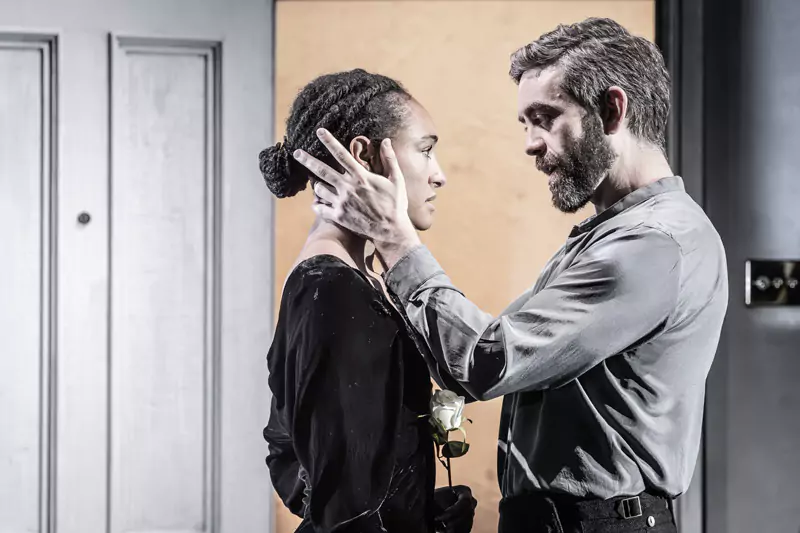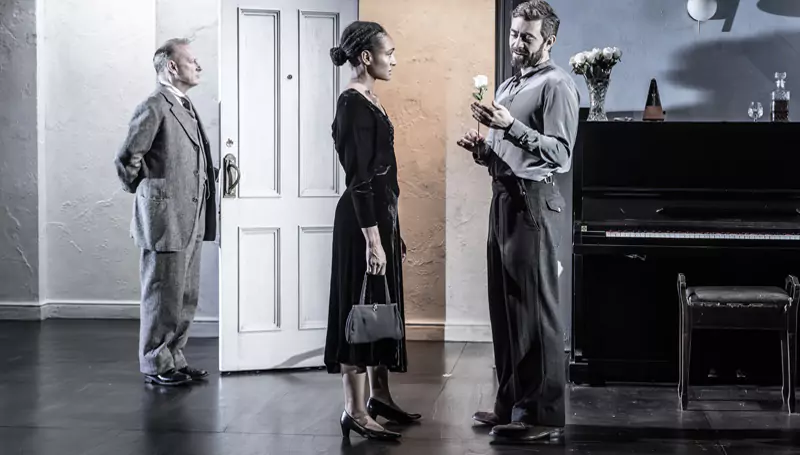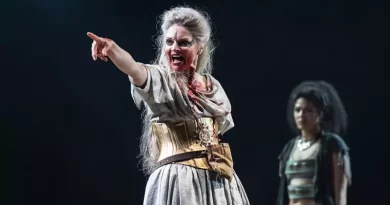“Visit from an Unknown Woman” at Hampstead Theatre
Neil Dowden in North London
16 July 2024
Christopher Hampton’s adaptation of Austrian writer Stefan Zweig’s 1922 novella Letter from an Unknown Woman has had a complicated production history. Directed by Hampton, it was first staged in German (translated by Daniel Kehlmann, whose plays Hampton has translated into English) at the Theater in der Josefstadt in Vienna in 2020 – though it was cut short by Covid, before having a successful run in 2022. The press night of this English-language premiere was also delayed by cast illness, but full marks to Hampstead Theatre for enabling Chelsea Walker’s polished production of Zweig’s fascinating story to continue.

Natalie Simpson and James Corrigan.
Photo credit: Marc Brenner.
It’s a tragic tale of a young woman’s obsessive unrequited love for an older, sophisticated man set in Vienna. As a teenager living with her widowed mother she secretly falls in love with their neighbour who is a playboy writer with a stream of lovers. After a few years away when her mother remarries, she returns to Vienna and has a three-night affair with the writer who does not recall her. Ten years later they meet again but he still doesn’t remember her, and doesn’t connect her with the bunch of white roses that he mysteriously receives on his birthday each year. By the time she tells him about everything – including a bereavement she has just suffered – is it too late for there to be a happy outcome?
Hampton has made some significant changes to the original – which is written in the form of an extended letter by the woman – but despite the amended title has not been bold enough. In contrast to the famous Max Ophüls 1948 Hollywood movie, which moved the action back about ten years to the pre-First World War Austro-Hungarian Empire, Hampton has transposed the story to the 1930s Nazi era. And in an effort to flesh out the rather shadowy writer figure, he has given him an autobiographical, Jewish persona (calling him “Stefan”, whereas he is just “R” in the novella).
But the few mentions of the dangerous political climate (including Stefan’s books being thrown on a bonfire and an opera for which he has written the libretto being taken off due to antisemitism, which is a reference to Zweig’s collaboration with Richard Strauss on the banned The Silent Woman) seem spurious and make little impact. Indeed, they actually distract from the emotional dynamic of the story which is about the eventual tragic realization by the woman that she has romantically fantasized about a self-involved man who is incapable of returning her feelings.
A passively self-sacrificing female protagonist (simply known as “Fräulein” in the original, but named as Marianne later in the play) who throws her life away for an undeserving man is rather problematic in itself, but Zweig gives her a passionate voice in telling her own story. Here, necessarily, Hampton has opened it out from just a monologue, but chunks of the letter are retained in the long scene when Marianne explains her history, which makes for static drama. Hampton of course had a huge success with another adaptation of epistolary fiction – Laclos’s eighteenth-century novel of intrigue Dangerous Liaisons – both in the theatre and cinema, but the letters there are written by multiple characters so there is already a built-in dramatic conflict.
Moreover, because Hampton has rejigged the structure of Zweig’s novella – rather confusingly at times – to try to make it work as a play, the final encounter between the couple suggests a potential positive future which is then unaccountably dashed by Marianne’s sudden exit. Unfortunately, the truth is that the story does not lend itself readily to theatrical representation.
Nonetheless, there is much to admire in Walker’s subtle, atmospheric production that tantalizes over 70 minutes but ultimately fails to move. The non-speaking, almost dance-like presence of Marianne as a young teenager who is usually watching intently from the shadowy edges of the stage, and sometimes interacts silently with the older Marianne (movement director Michela Meazza), lends the show a haunting quality. Rosanna Vize’s design of a smart but sparsely furnished apartment is fringed by decaying white roses with petals fluttering down effectively at the end like snowflakes. Bethany Gupwell’s subdued, moody lighting is impressive, while Peter Rice’s sound design evokes the Vienna nightlife.
The cast is led by an assured performance from Natalie Simpson as Marianne, who (without seeming as sinister as a stalker) occasionally suggests a disconcerting anger beneath her apparent acceptance of Stefan’s lack of interest – though most of the emotion is distilled from the heartache in the past. James Corrigan (replacing Thomas Levin at late notice) also does well in conveying the popular writer and man of the world Stefan who may be a master wordsmith but is emotionally illiterate, preferring to use his personal experiences as raw material for his books rather than committing himself to relationships. Nigel Hastings is his discreet and loyal valet Johann who does recognize Marianne, while Jessie Gattward makes her professional debut as the ghostly Young Marianne.









